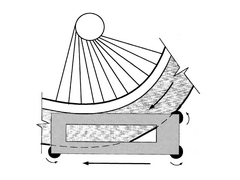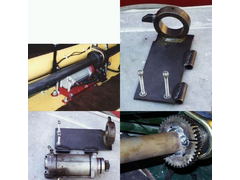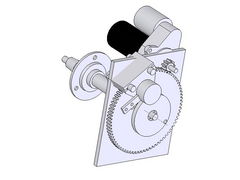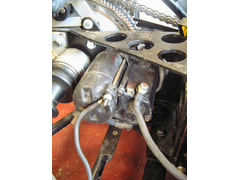
reverse gear
evo3500 - 9/8/04 at 07:00 PM
Hello,
can anybody tell me if anyone has done an electric reverse and made it work,Iam building a GT1 with a yamaha thunderace engine in it and im looking
for a way to fit a reverse.
Anyone got any ideas ?
Also has anyone put there car through the sva emmissions test how did you do it.
Cheers Simon.
Wadders - 9/8/04 at 08:03 PM
If i'm not mistaken, MK do one, and so do ST, but i guess they might need some adaptation to fit the GT1, as they are designed to suit a sierra
diff. John ison might know more. Theres a bloke on the becs list called gordon , who also has a system which works off the sprocket adapter rather
than the final drive, dunno if it would fit a thunderace tho?
As for emmisions, your gonna need a cat and lamda system to beat SVA.
Al.
i]Originally posted by evo3500
Hello,
can anybody tell me if anyone has done an electric reverse and made it work,Iam building a GT1 with a yamaha thunderace engine in it and im looking
for a way to fit a reverse.
Anyone got any ideas ?
Also has anyone put there car through the sva emmissions test how did you do it.
Cheers Simon.
Jon Ison - 11/8/04 at 09:38 AM
had reverse on the 1st GT1, a gear on one drive shaft driven by an electric motor, Mk supplied but dont think they built/made more than one as the GT1
ceased, i have plans for reverse on this one but useing a "5th" wheel ????
Peteff - 11/8/04 at 01:53 PM
Could you use a sprocket on an electric motor, like a 12v drill, scooter or something and put it on a lever so it pulls down onto the chain and spring
it so it lifts back up.
Jon Ison - 11/8/04 at 03:35 PM
thats the route i took 1st, only thing that prevented progress was the motor/gearbox where FOC and too big to fit in or should i say under the chain
as i want it to "fail safe" fall away from the chain not onto it should anything break, i'm gonna try the same motor/gearbox in the
side pod pushing a wheel down onto the road, it will be by my side so no messy linkages or cables, may not work but gonna try it.
Stuart Walker - 11/8/04 at 10:36 PM
I'm fitting bike pedals for the passenger.
No, really.
[Edited on 11/8/04 by Stuart Walker]
adamhay - 19/8/04 at 08:40 AM
Can someone post a link to a photo of the MK electric reverser? The one that attaches to a ford diff? TIA...
timf - 19/8/04 at 09:04 AM
have a look
http://www.hoverd.org/Tim/Fury/build_frames.html
here for another solution
adamhay - 20/8/04 at 01:00 PM
Cheers timf ! Exactly what I was after...
Rorty - 29/8/04 at 05:58 AM
I haven't heard of an electric or mechanical reverse mechanism yet (apart from those in dedicated transaxles) that is worth more than its own
weight in sh1te.
Most BEC drivers have grown accustomed to parking either on a slope, or with a clear forward exit. But what about those occasions when some unaware
tw4t blocks your carefully planned escape route?
Fear not! You can carry an emergency reverse kit in your boot! Quicky assemble the simple components, place in front of/under the rear wheels and
drive off in reverse under your car's own power.
How can this be done? Look at the sketch below. The reversers consist of a pair of lightweight (probably laser-cut aluminium) side plates, connected
by three rubber/PU rollers and three long studs. The studs would require shoulders to but against the plates to prevent the plates tightening up
against the rollers.
When you've reversed out of the jam, you simply retrieve the reversers, dissasemble them and pack them away again before driving off.
Triangular plates would be lighter, especially if they were skeletalised. The rollers could be solid PU hollow bar but three-bearing tube steel
rollers would turn better.
Who's going to make the first set?


Rescued attachment reverse03.jpg
tks - 29/8/04 at 02:40 PM
your idea is very good but you didn't mention if you are in a hurry or you need switching between forward en reverse..
adn then the biggest problem i see is if you are on a hill and you lift you rear wheels..then the brake only aplies to 1..
is a reverse a sva thing..??
i think i'm gona do it electric whit a extra starter motor from a diesel engine orso..
using the hole starter assembly..(with the sprocket cluctch..)
then when i place in reverse i will make a system that auto encreases the revs..(for more battery power..)
i think thats the best way to go..
or you place a reverse box in it..thats also a possibility..
but they are soow enormous costy..
the problem with the starter engine is controlling the speed of it..
there are not much resistors who can competete whit the start amperage....
TKS
Bob C - 29/8/04 at 03:14 PM
rorty - that is brilliant! only problem I can see is that you'd go forwards a foot or so before you started to go backwards. In fact with all the
pushing you'd have to do you'd be better off simply pushing the car back - but I still like the idea!
Re electric reverse control, you wouldn't use resistors to control it, you'd use PWM (pulse width modulation) with a big fat MOSFET -
it's infinitely controllable & ~90%efficient and gives a current multiplying effect at low speed. In a couple of years I'll make one
& publish circuit/layouts etc, if someone else hasn't done it before.
Plan is to use a pre-engaged starter off a fiesta and interlock the solenoid with the neutral switch. The controll system is wired between the big
output terminal on the back of the solenoid & the motor so it only gets juice once it's in gear. Long way to go before I worry about that
though!
Cheers
Bob
Rorty - 29/8/04 at 09:47 PM
Please don't take my submission too seriously. Whilst feasible, it was merely a tongue-in-cheek post to keep one of my favourite topics near the
top of the pile. 
liam.mccaffrey - 29/8/04 at 10:58 PM
i am currently working on a locost reverse box made from the gubbins of a type 9,
but don't hold your breath guys i have loads on
tks - 1/9/04 at 02:28 PM
If we want it to do it good..
we need to control a electric starter motor whit solenoid....
offcourse controlled whit i microcontroller
and offcourse only works it when the engine is in Neutral.
i think we need to start whit knowing the revs a starter engine makes....
then we calculate the minimum speed on a normal plain road.
and then whit a potentiometer we can control that speed.
if we do it this way, we will have also no
problems whit if there are small hills..
soow we have some pulling power..
we could make it also whit 2 motors..
TKS
Rorty - 7/1/05 at 02:10 AM
quote:
Originally posted by Bob C
Re electric reverse control, you wouldn't use resistors to control it, you'd use PWM (pulse width modulation) with a big fat MOSFET -
it's infinitely controllable & ~90%efficient and gives a current multiplying effect at low speed. In a couple of years I'll make one
& publish circuit/layouts etc, if someone else hasn't done it before.
Plan is to use a pre-engaged starter off a fiesta and interlock the solenoid with the neutral switch. The controll system is wired between the big
output terminal on the back of the solenoid & the motor so it only gets juice once it's in gear.
Bob C, any advancement since you posted this?
I like the idea of using a solenoid to engage the starter motor and using the bike engine's neutral switch to ensure the reverse actuation only
operates in neutral.
Your box of electrickery would obviously need to ensure it all happened in the correct sequence.
Here's an electric reverse system that slides on a hinge-type platform and engages with a split gear wheel that's welded onto the prop
shaft.


Rescued attachment elec_reverse_10.jpg
Sven - 7/1/05 at 04:54 AM
quote:
Here's an electric reverse system that slides on a hinge-type platform and engages with a split gear wheel that's welded onto the
prop shaft.
Looking at those pics of the motor on a hinge gives me an idea. If the hinge was operated by a handle that had a cam attached it would engage the
motor with the gear. At the point the gear is fully engaged a microswitch would be trigged that engaged the power.
The cam would be made so that once the gear is engaged the motor isn't raised anymore but the handle can still move back and forth to actuate a
wiper/rheostat that controls the speed of the motor. This would mean one wasn't depending on the single speed starter motor for speed and the
reverse would be more progressive.
I hope that was in english and understandable.
-Steve
Sven - 7/1/05 at 05:05 AM
I uploaded a pic into my archive of a Solidworks drawing I made to make it clearer ... I hope ...
-Steve
Rorty - 7/1/05 at 05:19 AM
quote:
Originally posted by Sven
quote:
Here's an electric reverse system that slides on a hinge-type platform and engages with a split gear wheel that's welded onto the
prop shaft.
Looking at those pics of the motor on a hinge gives me an idea. If the hinge was operated by a handle that had a cam attached it would engage the
motor with the gear. At the point the gear is fully engaged a microswitch would be trigged that engaged the power.
The cam would be made so that once the gear is engaged the motor isn't raised anymore but the handle can still move back and forth to actuate a
wiper/rheostat that controls the speed of the motor. This would mean one wasn't depending on the single speed starter motor for speed and the
reverse would be more progressive.
I hope that was in english and understandable.
-Steve
Perfect English Sven. Better than a lot of Brits on here!
Sounds like a definite maybe, though unless made to exacting tolerances, it could be problematical. Is it too complicated? Probably not, but may be
beyond the scope of some people to make it accurately enough.
If a manufacturer got behind it, you may be able to sell a kit.
Why not knock one up tonight and test it tomorrow and let us know how it goes? 
Bob C - 7/1/05 at 12:50 PM
>>>Bob C, any advancement since you posted this?
I like the idea of using a solenoid to engage the starter motor and using the bike engine's neutral switch to ensure the reverse actuation only
operates in neutral.
Your box of electrickery would obviously need to ensure it all happened in the correct sequence. >>>
Hi Rorty,
some progress - the design is still in my head at pres. but I've started to download it to solidworks. Because I want to use the big 'prop
cog' also as a parking brake, it's proving a bit hard to fit everything in - I'd like all the bits to be at the top away from road
grime etc. I'll post an interim picture when I get home tonight. The engagement solenoid IS the starter motor one so it's a standard starter
motor with the big wire between motor and solenoid swanning off to the power controller. I've got a vauxhall cavalier starter motor which is
comparatively small & light.
One problem is that you "want" to control motor current with the throttle pedal - but that would total the engine very quickly (racing away
in neutral) so I'm considering pulling the accelerator UP to control the reverse motor or putting another little accelerator pedal under the
proper one. (???)
The electronics, I've not started on yet & won't for some time - that doesn't worry me, it's what I get paid for (though
controlling several hundred amps should be 'interesting' Anyone wanting to do it should note that circuit layout is absolutely critical, if
we're talking about di/dt around 10^9 a nanohenry of parasitic L is all it takes to get a volt (not to mention the emi.......)
Anyone wanting to do it should note that circuit layout is absolutely critical, if
we're talking about di/dt around 10^9 a nanohenry of parasitic L is all it takes to get a volt (not to mention the emi.......)
I'll post a pic' later
Bob
Sven - 7/1/05 at 07:15 PM
quote:
Perfect English Sven. Better than a lot of Brits on here!
I am english, mate, just exiled in a strange land. Glad you understood it.
quote:
Sounds like a definite maybe, though unless made to exacting tolerances, it could be problematical. Is it too complicated? Probably not, but may be
beyond the scope of some people to make it accurately enough.
If a manufacturer got behind it, you may be able to sell a kit.
Just an idea. You're right, making it as per the drawing is pretty non-trivial, but the idea could be further developed into something that we
could actually make?
quote:
Why not knock one up tonight and test it tomorrow and let us know how it goes? 
I have a date with Lois Lane, sorry ... 
-Steve
Bob C - 7/1/05 at 07:53 PM
pic of reverse/handbrake in early stages!
cheers
Bob


Rescued attachment trbrk.jpg
Rorty - 7/1/05 at 09:39 PM
Sorry Sven, I thought you were a Swede (or turnip or something). 
here's a tired looking version of Bob C's idea.


Rescued attachment reverse_drive06.jpg







 Anyone wanting to do it should note that circuit layout is absolutely critical, if
we're talking about di/dt around 10^9 a nanohenry of parasitic L is all it takes to get a volt (not to mention the emi.......)
Anyone wanting to do it should note that circuit layout is absolutely critical, if
we're talking about di/dt around 10^9 a nanohenry of parasitic L is all it takes to get a volt (not to mention the emi.......) 



